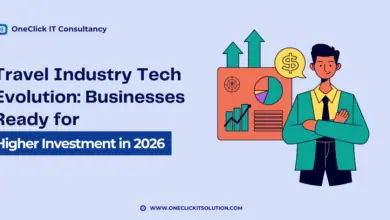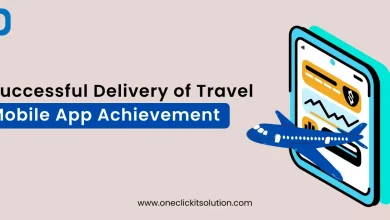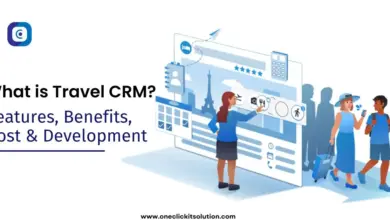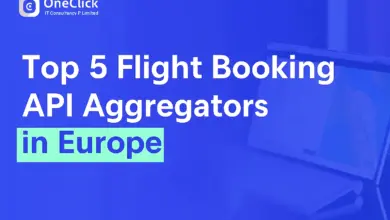Custom Travel Tech Solutions: The Future of Hospitality Management
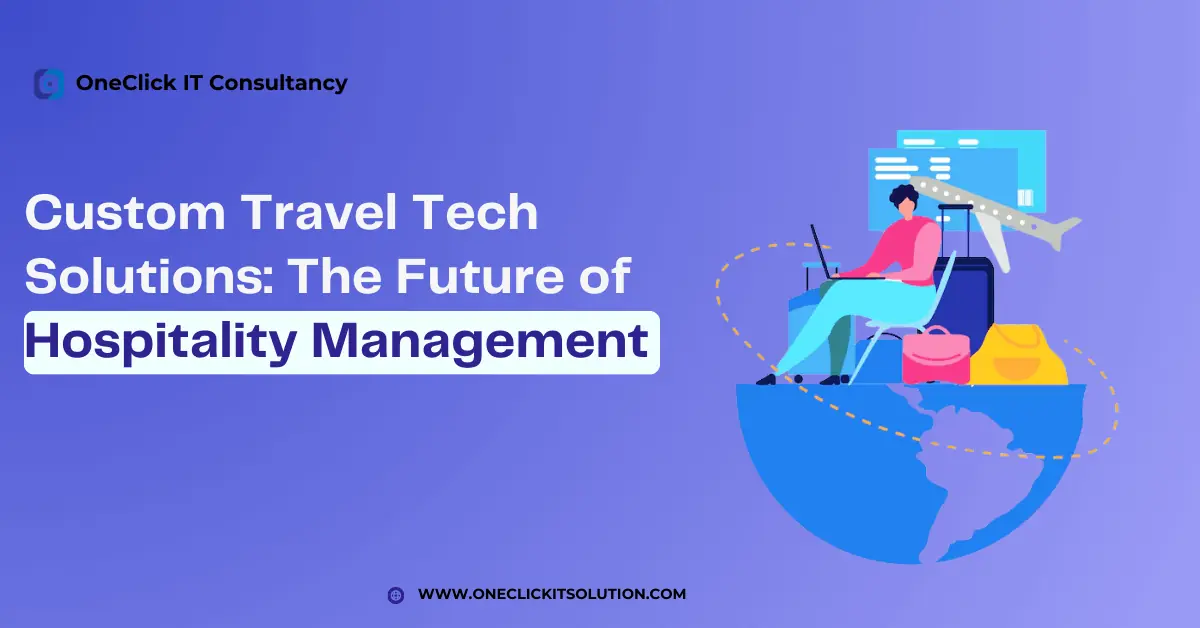
Looking for transformative travel tech solutions for the hospitality industry? Learn the ways custom travel technology platforms transform the industry by optimizing operational efficiency, improving service delivery, and enhancing profitability.
The competitive landscape of the hospitality industry is perhaps one of the most digitally advanced as businesses continuously reimagine the experience offered to travelers during their entire journey. Technology presents itself to progressive enterprises as an invaluable partner in success and growth. With its pace of change, technology impacts businesses in myriad ways, transforming everything from distribution to customer relationship management.
A Journey Through the Evolution of Technology in Hospitality
The hospitality industry is one of the most noted sectors in the world that has undergone an evolution from relatively olden days till now. The industry has embraced Information Technology through travel software and hospitality solutions. Currently, travel technology solutions offer airline and hotel operation automation, guest booking, and maintaining exceptional service levels for guest satisfaction.
The Development of Computerized Reservation Systems (1970-1990)
The advancement of travel technology solutions like Global Distribution Systems (GDS) became essential for hotels to tap into worldwide markets. Some of the major GDSs are:
- Sabre: This GDS was established in 1960, and its 1970s intervention propelled it further. It pioneered the connection of real-time interfacing between airlines and hotels. This innovation enabled service providers to book hotels where conferences are held, thereby saving valuable time and resources.
- Amadeus (1987): Became a leading provider of travel & hospitality technology solutions.
- Galileo: Galileo was first created in 1971 under the name Travicom. It was later rebranded to its current name in 1987 when it could connect travel agencies with service providers. In 2007, Galileo and Worldspan were combined, and it became Travelport.
These apparatuses enabled institutions to reach an international audience and announce themselves with much more powerful voices than they were used to. Since hotels were linked to such GDSs, they showed increased visibility in the market and a lot of people could know about the room availability and rates, thus the process of booking became much easier and standard for an agent. On the hotel side, rates were a new complexity that the hotels had to understand and control. This balancing act can be made easier with the help of sophisticated travel software and hospitality solutions that provides revenue managers the ability to orchestrate rate decisions dynamically to ensure that their hotel is priced competitively and meeting the needs of demand.

The New Age (1990 – Present)
The Beginning of The Public Internet Age (1990 – 2000)
- The Birth of the First Hotel Websites: The Importance of Having an Online Presence. Some businesses immediately recognized the advantage of building a website.
- Beginning of RMS Development: Initially concentrating on historical data, Revenue Management Systems (RMSs) started to take form.
The Internet Era: The Main Focus Became OTAs (2000-2010)
The advent of technology travel solutions came with Online booking portals and OTAs which greatly commercialized by giants such as Expedia Travel API and Booking.com, obliterated the competition. These companies have completely reinvented the industry and have made traveling accessible to anyone, offering unprecedented ease and options to consumers.
Airbnb emerged and has entirely changed the concept of booking vacation lodging since 2008. This new platform quickly disrupted the current booking model, advancing passengers’ ability to choose from a broader range while also seeking new one-of-a-kind, increased personalization choices for accommodation. At the same time, RMSs find themselves in an increasingly competitive environment, with new, sometimes unforeseeable distribution channels constantly cropping up. RMS can only keep up and stay competitive by incorporating additional, sometimes unstructured data sources to gain more insight into the processes and customers control. Thus, the entire sector was continuously adapt to the new world.
Since 2010, the Democratization of SaaS and Artificial Intelligence.
- Mobile technologies: We started to make bookings from smartphones and tablets.
- Advanced RMS: AI and Big Data powered the RMSs with real-time predictive analytics, dynamic pricing, and advanced customization.
- The fungibility of digital solutions steered by the SaaS model witnessed a surge in competition among providers seeking to offer innovative technological solutions.
- Solutions become more accessible through the APIs and a unified lexicon due to collaborative efforts of the HTNG (Hospitality Technology Next Generation) association which works for the collaboration between hoteliers and tech partners.
- From an engineering standpoint, smooth movement between solutions became easier due to a plug and play vision from marketplace solutions like Planet Marketplace and Oracle’s OHIP, even though integration issues still exist.
What are Custom Travel Solutions?
Custom Travel Solutions are bespoke or specific software development and custom technology systems for an IT, which focuses on a particular segment of the travel industry. These solutions address different components of travel business operations, customer service, experience management, and also travel planning and scheduling.
Why are Custom Travel Solutions Important?
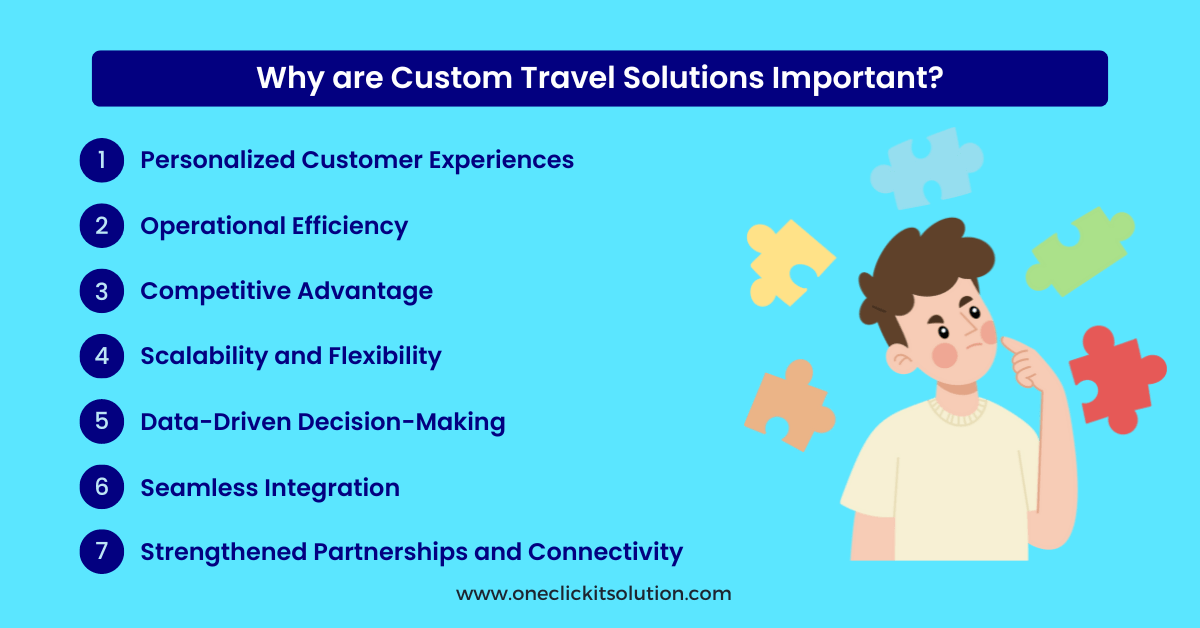
Custom Travel Solutions are of utmost importance to the travel businesses because it aids the travel sector in emerging with rapid changes in the modification of the world which is influenced by new technologies and innovation. Custom travel solutions are increasingly sought after for many reasons:
1. Personalized Customer Experiences
Even as customers continue to ask for enhanced travel experience, travellers want firms to provide personalized experiences. Consequently, companies must adapt their offerings, services, and digital interfaces to suit customers’ needs and desires. As clients’ expectations about the service and unique needs grow, the companies’ marketing and engagement strategies should align with the demands. Custom travel software enables hyper-personalization using AI-driven insights, improving engagement and customer satisfaction.
2. Operational Efficiency
Automation through travel and hospitality IT solutions eliminates manual inefficiencies in reservations, pricing, and supply chain management.
3. Competitive Advantage
The modern business environment is extremely competitive. As more companies attempt to attract the same people’s attention, achieving uniqueness becomes a key goal. Naturally, each organization aims to attract as many clients as possible, and being unique helps them accomplish this task. By delivering custom services and unique value propositions, companies acquire a powerful weapon to approach certain target groups and stand out among their competitors.
Offering custom travel technology platforms provides businesses with unique value propositions, helping them stand out.
4. Scalability and Flexibility
A custom solution allows companies to respond to market trends and changes in consumer preferences. Whether entering different markets or adjusting to a wave of customers, a custom solution guarantees that companies have the edge. Businesses need scalable travel and hospitality industry solutions to expand and adapt to evolving market trends.
5. Data-Driven Decision-Making
In the fast-paced world of travel, Many custom guest travel solutions incorporate cutting-edge analytics features, allowing a business to view in-depth customer behavior patterns, market progress, and emerging prospects. With these tools, a business can expand its data-driven decision-making, fine-tune its freight pricing, and provide competitive leverage across every aspect of its operation.
6. Seamless Integration
An interconnected world as we know it today mostly requires integration to provide customers with a cohesive experience. Custom travel software integrates with existing systems, ensuring a connected and efficient travel ecosystem. From more straightforward booking procedures to improved messaging lines, everything works in harmony to assist you in achieving the best possible customer experience.
7. Strengthened Partnerships and Connectivity
Like any other travel industry, teamwork is simply a must. One must be able to work well, not only with the airlines, for example, and the hotels but also the tour operators and the travel agencies – in other words, every player of the international market. Travel & hospitality IT solutions facilitate collaboration among airlines, hotels, and tour operators for enhanced service delivery.
AI: Transforming the Hospitality Landscape
Artificial intelligence, a system based on software that can learn, reason, and decide from data entry, has been established as humanity’s dream. From intelligent virtual assistants to autonomous vehicles, the industry has a vast potential to be revolutionized with its applications.
The technology is scaling in the hospitality sector, and generative art intelligence is becoming the focal pivot for most players. This is evidenced by a SITA report referring to the development of AI technologies programs by 97% of airlines.
According to IDC, its potential to improve customer service is significant, as more than 40% of hoteliers expect to develop predictive AI this year. Airlines have reached a significant development progress too. Thus, 86% are working on AI, machine learning, and computer visuals with innovation partners, among which 39% are implementing existing technologies and 47% are developing their programs.

AI and Technology: Selecting the Best Tech to Revolutionize Hospitality
It’s clear that we have entered an AI-accelerated world, and the pace at which the hospitality industry adapts has become a pressing issue. But which forms of AI best harness stakeholder outcomes?
Contactless Services: Effortless Technology, Impeccable Stay
Availing of contactless technologies is redefining hospitality to meet the ever-changing needs of the people who travel now rather than just respond to the COVID-19-inspired transition to everything to minimize contact. Contactless services could make the guest journey smoother and less time-consuming by eliminating areas and zones where physical contact occurs. Core contactless services include mobile check-in, digital keys to unlock doors and voice- or tablet-command room automation that lets customers breeze through the hotel. citizenM, the hotel brand, has completely disrupted check-in and the room experience with its very successful minimum-fuss app.
Other popular tools, such as WhatsApp, allow hotel staff to constantly contact customers during their stay, respond immediately to requests, and provide bespoke services.
Tech-Driven Innovation
Migrating to a fully cloud-based solution is essential. This enables real-time sharing, better service orientation, and personalization of the guest experience, improving all hotel departments. Robotic systems optimize processes and increase efficiency. They reduce staffing requirements and allow managers to respond to problems in real-time and with accountability.
Augmented reality offers new, more interactive, and comprehensive opportunities for learning. AR can be increasingly used in hotel and airline marketing – providing people with a more spontaneous and sustainable understanding of environments.
Hyper-Personalization
In today’s world where everything seems standardized, guests crave tailor-made experiences, reflecting their specific tastes and dreams. In the hospitality realm, hyper-personalization meets this demand by using technology-driven micro-segmentation. This approach ensures that every interaction with guests is finely tuned to their current needs and behaviors, creating truly memorable experiences.
This could mean, for example, eliminating “deadlines,” such as check-in/check-out and F&B closing times, knowing if a customer wants to accompany him/her through check-in or does it contactlessly, personalizing room temperature, lighting, and amenities, or urgently and correctly tailoring F&B opportunities. On a hotel-level view, this allows for more efficient dynamic pricing strategies, higher guest-spent experiences, or promotional loyalty schemes with commercial partners.
Future of Hospitality Management
Adopting and integrating specialized custom travel technology services is one of the most important aspects in the future of hospitality management, as these platforms and applications will enable the sector to transform and help businesses remain innovative and agile towards the needs of modern-day travelers.
Hyper-personalised guest experiences with custom travel tech solutions
Personalization is the primary core which allows to uplift the one-size-fits-all model within the hospitality segment and with the use of modern data analysis, machine learning, and artificial intelligence, Custom Travel Tech Solutions can provide sophisticated tailored guest experiences in accordance to the individual visitor’s preferences, behaviors, and history.
For instance, one can check into a hotel and find the room temperature adjusted to their specific liking, the entertainment options tailored to the available playlists on smartphone devices, and a receptionist stand ready with a list of recommendations on local eateries and tourism attractions ideal for visitors matching their traveling persona based on experience and travel style. These were mere fantasies once, made real through Custom Travel Tech Solution.
Seamless Guest Experiences – from Booking to Checkout
No more waiting in long lines and employing clunky booking systems with custom tech solutions. Mobile apps serve as a one-stop shop for guests to book on-site and off-site activities, order room service, receive real-time updates, and, most significantly, check out. Thanks to wearables integration, hotels can build user-friendly mobile apps that allow contactless access to rooms.
Easy Operations and Automation
The future of hospitality management is in custom travel tech solutions to facilitate the seamless operation of the industry. These systems will automate the different processes and reduce the number of prevalent manual interventions in the sector. For instance, merging the different hotel divisions such as reception, housekeeping, maintenance, as well as revenue management would enhance communication and collaboration throughout the entire hotel Wu et al., 2021. Besides, automation will surely boost productivity and human error while shifting the staff’s focus to crafting unforgettable experiences for the guests.
Contactless and Touchless
Due to the COVID-19 pandemic, the hospitality industry believes the future is contactless and touchless. As a result, they can use custom travel tech solutions to offer mobile check-in and check-out. They will also employ contactless payments, voice control devices, and digital concierge services to promote guest convenience and safety while allowing hospitality companies to be the first to embrace new technology.
Emerging Technologies – Blurred Reality
Virtual and Augmented reality could also be implemented in hospitality in the future. VR tours introduce customers to possible destinations before the booking experience, while AR can show clients possible layouts and additional room options. In that regard, hotels can implement VR to familiarize guests with interiors and exteriors before settling on a booking and integrate AR technologies for the guest’s experience while in the hotel.
Revenue Optimization and Dynamic Pricing
Custom travel tech solutions powered by advanced analytics and machine learning algorithms can enhance revenue management strategies. Constant monitoring and analysis of information such as data, trends, market activity, and other relevant areas will enable promotional tailoring and personal pricing, thus yield management and advanced data offerings. All these factors will assist in improving profits whilst delivering value for the guests.
Integrated Ecosystems and Partnerships
A network or interrelated network defined by partnerships and ecosystems will compose the future of hospitality management. Custom travel tech solutions will help integrate platforms with more stakeholders, such as online travel agencies, global distribution systems, and other third-party service providers. As a result, all the previously isolated systems will work in conjunction, boosting collaboration, integrating more efficient distribution channels, and, ultimately, providing guests with a complete travel experience.
Sustainability and Environmental Consciousness
As environmental issues become more pronounced, custom travel tech solutions will be integral to enabling the implementation of many sustainable practices in the hospitality industry. Whether it is energy-efficient building management, waste reduction and reuse, or eco-friendliness of the services offered to guests, these solutions will enable the hospitality business to put new value in sustainability and help make the world greener.

Conclusion
Custom travel tech solutions aren’t a luxury—they are required to future-proof hospitality businesses. Hotel and Travel with OneClick IT Solutions – Customising industry leading solutions to give you the business advantage.
Contact us today and give your hospitality business a boost!


